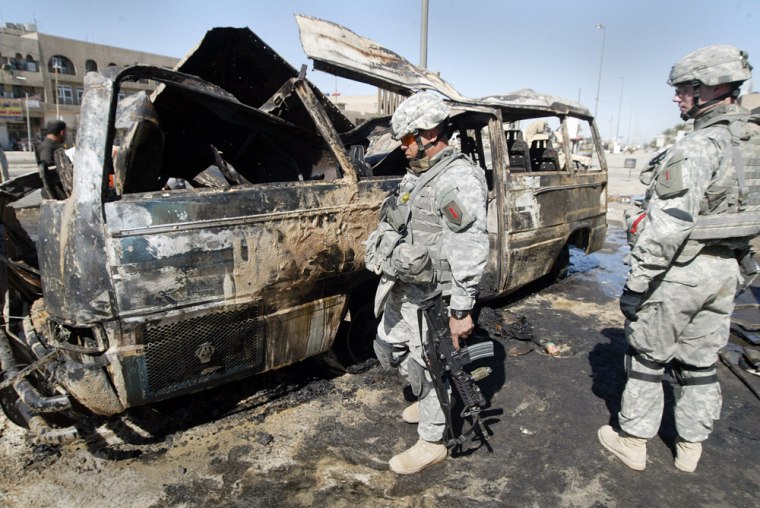With violence down in Baghdad, U.S. troops will fan out into communities on the rim of the capital to shut down car bomb factories, which remain a threat despite a recent drop in execution-style killings in the city, the U.S. military said Monday.
Dozens have been killed by bombs in Baghdad over the last three days, including three security guards who died Monday in a blast targeting an Agriculture Ministry convoy.
Chief U.S. spokesman Maj. Gen. William Caldwell said most of the car bombs and improvised explosive devices — the military’s term for roadside bombs — are believed to be assembled in makeshift factories in towns just outside the capital.
“And that’s where the greater presence of these forces will go,” Caldwell said without elaborating or giving a timeframe.
U.S. officers have said Baghdad, a city of about 6 million, cannot be secured without extending the security operation into communities that control major highways into the capital. Many Sunni and Shiite extremists are believed to have withdrawn to those outlying areas since the U.S.-led security crackdown began in Baghdad on Feb. 14.
Late Monday, thunderous explosions could be heard from the south of the city, and Arab television stations said U.S. forces were shelling two mostly Sunni districts near the Dora neighborhood — the scene of several bombardments in recent weeks.
At a news conference, Caldwell said U.S. and Iraqi troops have destroyed “two or three” car bomb factories since the Baghdad security operation began.
42 killed Sunday
But that has not stopped the bombers.
On Sunday, an explosives-laden car rammed a flatbed truck packed with Shiite pilgrims, killing 32 people in the mostly Shiite neighborhood of Karradah.
In another part of the city, a suicide bomber detonated a belt packed with metal fragments inside a minibus heading to a mostly Shiite area, killing 10 people and wounding five.
The day before, 20 people died in a car bombing about 300 yards from a joint U.S.-Iraqi security station in Sadr City, stronghold of the Mahdi Army of radical Shiite cleric Muqtada al-Sadr.
Hundreds of Shiites turned out Monday for funerals of victims of Sunday’s blast. They marched alongside 10 caskets placed on top of minivans, beating their chests and shouting, “There is no God but Allah.”
One man sat atop a minivan, his head lowered, holding the photograph of a victim.
The blast that hit the Agriculture Ministry convoy occurred in the southeastern Baghdad district of Zayouna, killing three security guards and wounding one, officials said.
An Iraqi-U.S. patrol was targeted Monday by two roadside bombs detonated about 150 feet apart in western Baghdad, wounding two civilians, police said. It was not clear if any soldiers were injured.
The security crackdown has seen a decline in execution-style killings, random shootings and rocket attacks, in large part because Shiite political parties have been successful in convincing Shiite militias to pull fighters off the streets to avoid a showdown with American troops.
On Monday, police found nine bullet-riddled bodies in Baghdad — apparent victims of Sunni-Shiite reprisal killings. Before the security crackdown, the daily count was running above 50.
However, Sunni extremists have continued their car bombings and suicide attacks, apparently seeking to draw Shiite gunmen back into the streets. That would provoke an armed confrontation between the Americans and the Shiite militias, which drove tens of thousands of Sunnis from the city during last year’s sectarian bloodletting.
Three more brigades coming
Despite recent improvements in security, the bombings have proven frustrating for many residents after nearly four years of explosions, shootings, kidnappings and sectarian murders. Each blast brings fresh complaints that the security crackdown has not ended the carnage.
At the news conference, Caldwell urged the public to be patient. He said only two of the five U.S. Army brigades earmarked for the crackdown are operating in the city and a third is beginning to arrive in Kuwait.
“But the buildup will continue through the spring time, and it will be late May before all the forces are here in the Baghdad area,” he said.
During a meeting Monday with provincial governors, Prime Minister Nouri al-Maliki said extremists would flee to the hinterlands “as we put pressure on the terrorist organizations in Baghdad.”
“Some of these gangs fled to the provinces and have become active recently, targeting innocent people and committing random murders,” al-Maliki said. “So the role of security services in the provinces is very important. The government is ready to offer the necessary help. We are beginning to confront terrorism, and we must continue to do so.”
Outside the capital, a suicide car bomber detonated explosives near an Iraqi checkpoint in Ramadi, killing himself and wounding 15 people, mostly civilians, the U.S. military said. Iraqi troops opened fire and disabled the vehicle far enough from the checkpoint to prevent more casualties, the military said.
Police in Wasit province, southeast of Baghdad, recovered five bodies from the Tigris River, two of them decapitated, officials said. One of the bodies was a woman wearing a gold necklace and earrings who had been shot in the head, police said.
In northern Iraq, gunmen assassinated the director of a government irrigation project, police reported. A mortar shell also exploded at the headquarters of President Jalal Talabani’s Kurdish party in Mosul, wounding four guards.
